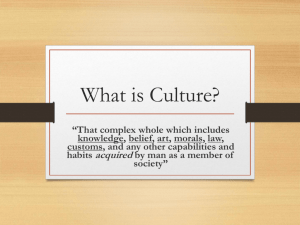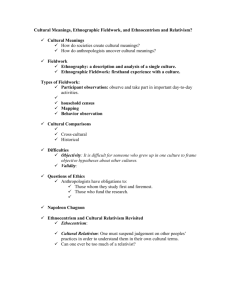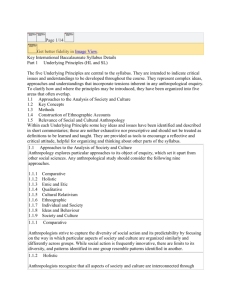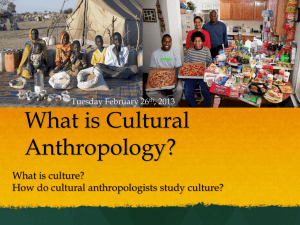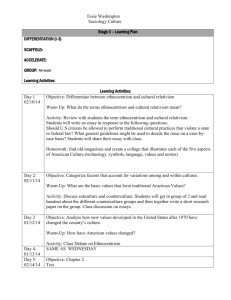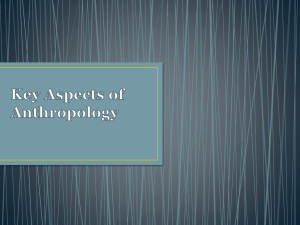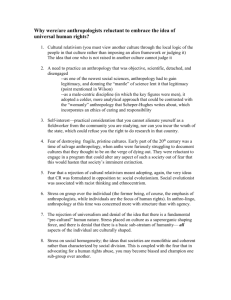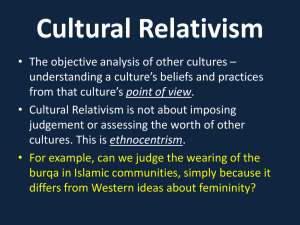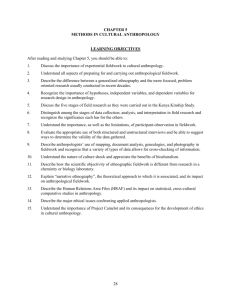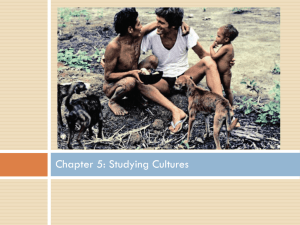Cards week 1
advertisement
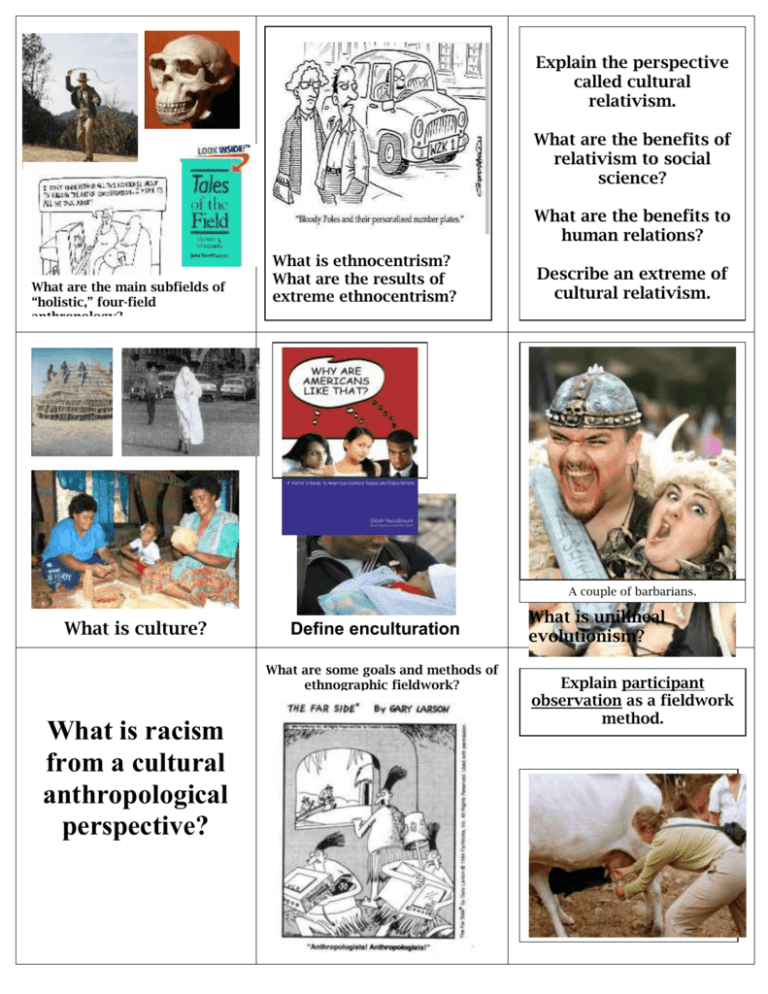
Explain the perspective called cultural relativism. What are the benefits of relativism to social science? What are the benefits to human relations? What are the main subfields of “holistic,” four-field anthropology? What is ethnocentrism? What are the results of extreme ethnocentrism? Describe an extreme of cultural relativism. A couple of barbarians. What is culture? Define enculturation What are some goals and methods of ethnographic fieldwork? What is racism from a cultural anthropological perspective? What is unilineal evolutionism? Explain participant observation as a fieldwork method. Relativism is the understanding that a group’s knowledge, social systems, beliefs, and ways of doing things are relative to that group’s environment, its history, and its circumstances. To understand one part of a culture is to realize that it is part of a whole and cannot be separated and understood without knowing more about the whole. For the sake of scientific accuracy, anthropologists must suspend judgment in order to understand the logic and dynamic of other cultures. One extreme of relativism is to have no opinion – even when issues concern human rights and human atrocities. To say, “Well, that’s just their culture” in response to killing, torture, and concentration camps is extreme relativism. Human rights, however you define them, are perhaps a dividing line for relativity. When Europeans began to expand their travels over the globe, they found people who lived differently than they did. These travelers wanted to explain why these differences existed. Believing that Western Europe was the pinnacle of human evolution, travel writers and social thinkers often theorized that peoples must all start out “primitive” and then, over time, progress to an “advanced” state. People in other places would eventually “evolve” to be like Europeans. This way of thinking was called unilineal evolutionism. Early anthropologists subscribed to this theory. It became a common way to compare European and EuroAmerican societies with others. Many people still tend to think along these lines. Most anthropologists have long since abandoned this view of human differences. The proposed stages of unilineal evolution were savagery to barbarism to agriculture and then to urban-based civilization. People were thought to evolve socially from simple to more complex societies. Participant observation is a primary approach to data collection in ethnography. The researcher immerses herself/himself in the culturesharing group and becomes a participant within the setting (Creswell, 1998). Ethnocentrism is: The belief that one’s own culture, religion, way of doing things, beliefs, economic system etc. is superior. All peoples, to some extent, believe their group’s ways of doing things are best. If people did not respect their own group’s worldview, they would likely not follow the rules and expectations of their group. Social cohesion would be difficult. We are a group animal, so ethnocentrism is partly about survival. However the extremes of ethnocentrism are ugly. They include fear, hatred, racism, war, genocide, culturecide, etc. Linguistic anthropology is the study of human speech and language. Physical or biological anthropology this is the study of human biology within the framework of genetic changes in populations over time … or evolution it is the study of how biology interacts with culture. We are born with our biology. We learn our culture. But culture influences biology and biology influences how we learn culture. Archaeology is the study of earlier cultures and lifeways. Anthropologists find and recover material remains of past cultures. They analyze and interpret those remains. Cultural anthropology is the study of all aspects of human life in, and associated with, groups. Enculturation is how we learn culture. We understand culture because we pick it up through the interactions we have with other people throughout childhood and until we die. We learn as children by the way people react to us and our behavior. We learn culture from everyone around us and the things they do and say. Rarely do people give us formal lessons about culture because most of culture is taken for granted. No one necessarily tells us how to behave in an elevator, for example. Culture is the acquired knowledge that people in a culture group share and use to interpret their world and generate social behavior. Culture is learned, shared, arbitrary, integrated, symbolic, moral, limit setting, changing, adaptive, and sometimes maladaptive. We learn a great deal of our culture while we learn language, and without language there would be no culture. Participant observation as a method of fieldwork research. Informal and formal interviews as a method of fieldwork research. (There are other research tools as well.) Emic perspective as a research and analytical goal. Etic perspective as a research and analytical goal. Hypothesis as a tool in research. Theory as a tool in analysis. Ethnography as an end result. Ethnology as an end result. The definition of racism is the belief that some human populations are superior to others because of inherited, geneticallytransmitted characteristics. Perhaps racism also includes the very belief that there exist biologically separate races. Many Americans believe that people can be divided into races. Cultural anthropologists have long argued that racial groups are cultural constructions. These cultural constructions represent the way North Americans, or other societies, classify people rather than a genetically determined reality. As most biological anthropologists agree, no group of humans has been isolated from other humans long enough to make whole groups of people significantly different. We are one of the least diverse species, which means we are a young species as species go.
